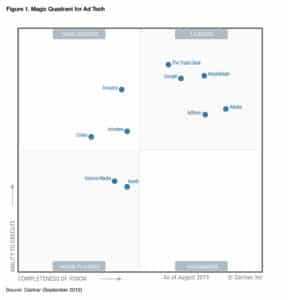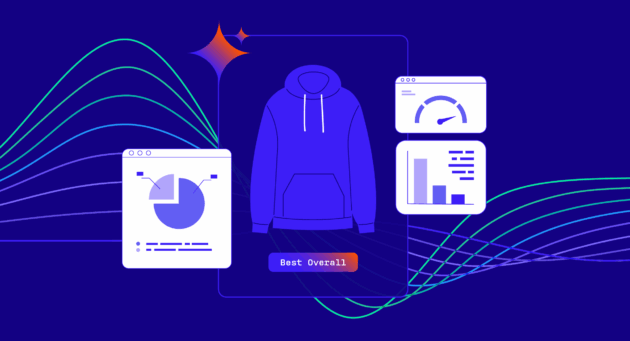On Thursday 12th September 2019, Gartner analysts Andrew Frank, Lizzy Foo Kune and Eric Schmitt released their long-awaited Gartner Magic Quadrant for Ad Tech report (G00376328).
Gartner Magic Quadrants are vendor evaluations plotting offerings against two XY axes: completeness of vision and ability to execute. In our own view, although MQ’s looks only bi-dimensional, each axis is made of respectively (for this MQ) 8 and 7 criterion. New this year is the addition of Gartner Peer Insights reviews by technology users into the web version (available to Gartner subscribers only).
There’s been quite some change in a year, the quadrant going from eight to ten vendors, starting (naturally) with Criteo (NASDAQ: CRTO). Criteo went from being mentioned last year to being positioned in the Challenger quadrant this year, as Criteo transforms to a multi-product company, going beyond retargeting and performance.
Marketing Solutions now offers a self-service platform enabling marketers to engage with audiences throughout the full marketing funnel with solutions to drive Awareness, Consideration and Conversion.
And our Retail Media offerings enable retailers to monetize their data and audiences for brands to engage with their own shoppers. This research has a clear orientation towards in-house brand marketers, seeking to guide those technology buyers for their digital advertising needs. The performance aspect (digital advertising with the purpose of converting users into active shoppers), Criteo’s historical stronghold, is a secondary focus for the authors. This explains why Gartner positioned Criteo in the Challenger quadrant.
The market is still very fragmented and the ten players in this updated MQ are quite different in positioning and capabilities. The authors have done a fine job describing each in the document -see link below. Most vendors claim to be platforms aggregating DSP (demand-side platform), DMP (data management platform) and DCO (dynamic creative optimisation) functionalities, yet not all have integrated end-to-end workflows, varying level of automation and AI capabilities.
Looking at where marketers spend their budgets is another way to segment the market. According to the latest market shares published by IDC, another leading industry analysis firm, Criteo is the clear AdTech market leader with the number one market share. See this report here.

Gartner does not endorse any vendor, product or service depicted in its research publications, and does not advise technology users to select only those vendors with the highest ratings or other designation. Gartner research publications consist of the opinions of Gartner’s research organization and should not be construed as statements of fact. Gartner disclaims all warranties, express or implied, with respect to this research, including any warranties of merchantability or fitness for a particular purpose.
GARTNER is a registered trademark and service mark of Gartner, Inc. and/or its affiliates in the U.S. and internationally, and is used herein with permission. All rights reserved.
Gartner makes another couple of interesting points, well worth reading in the report (see link below).
According to Gartner, “A key decision in the evaluation of ad tech providers involves the issue of neutrality — that is,
the principle that ad tech platforms should be independent of the media interests they mediate and measure.”
And still in this report, Gartner writes: “Looking ahead, existing and future regulations targeting the largest internet companies and marketer resistance to walled garden policies may drive the market back toward open solutions. They could also drive larger publisher conglomerates and retailers to abandon open-internet ad markets in favor of their own walled gardens, creating a challenging, fragmented landscape for both marketers and ad tech providers.”
Disclaimer
Gartner does not endorse any vendor, product or service depicted in its research publications,
and does not advise technology users to select only those vendors with the highest ratings or other designation.
Gartner research publications consist of the opinions of Gartner’s research organization and should not be construed as statements of fact. Gartner disclaims all warranties, express or implied, with respect to this research, including any warranties of merchantability or fitness for a particular purpose.
Check the updated 2020 MQ here.














